Charles baudelaire with the flowers Black & White Stock Photos
(7)See charles baudelaire with the flowers stock video clipsCharles baudelaire with the flowers Black & White Stock Photos
 Portrait of Charles Baudelaire. Date: 1855. By Nadar. Stock Photohttps://www.alamy.com/image-license-details/?v=1https://www.alamy.com/portrait-of-charles-baudelaire-date-1855-by-nadar-image575197025.html
Portrait of Charles Baudelaire. Date: 1855. By Nadar. Stock Photohttps://www.alamy.com/image-license-details/?v=1https://www.alamy.com/portrait-of-charles-baudelaire-date-1855-by-nadar-image575197025.htmlRM2TBPDJW–Portrait of Charles Baudelaire. Date: 1855. By Nadar.
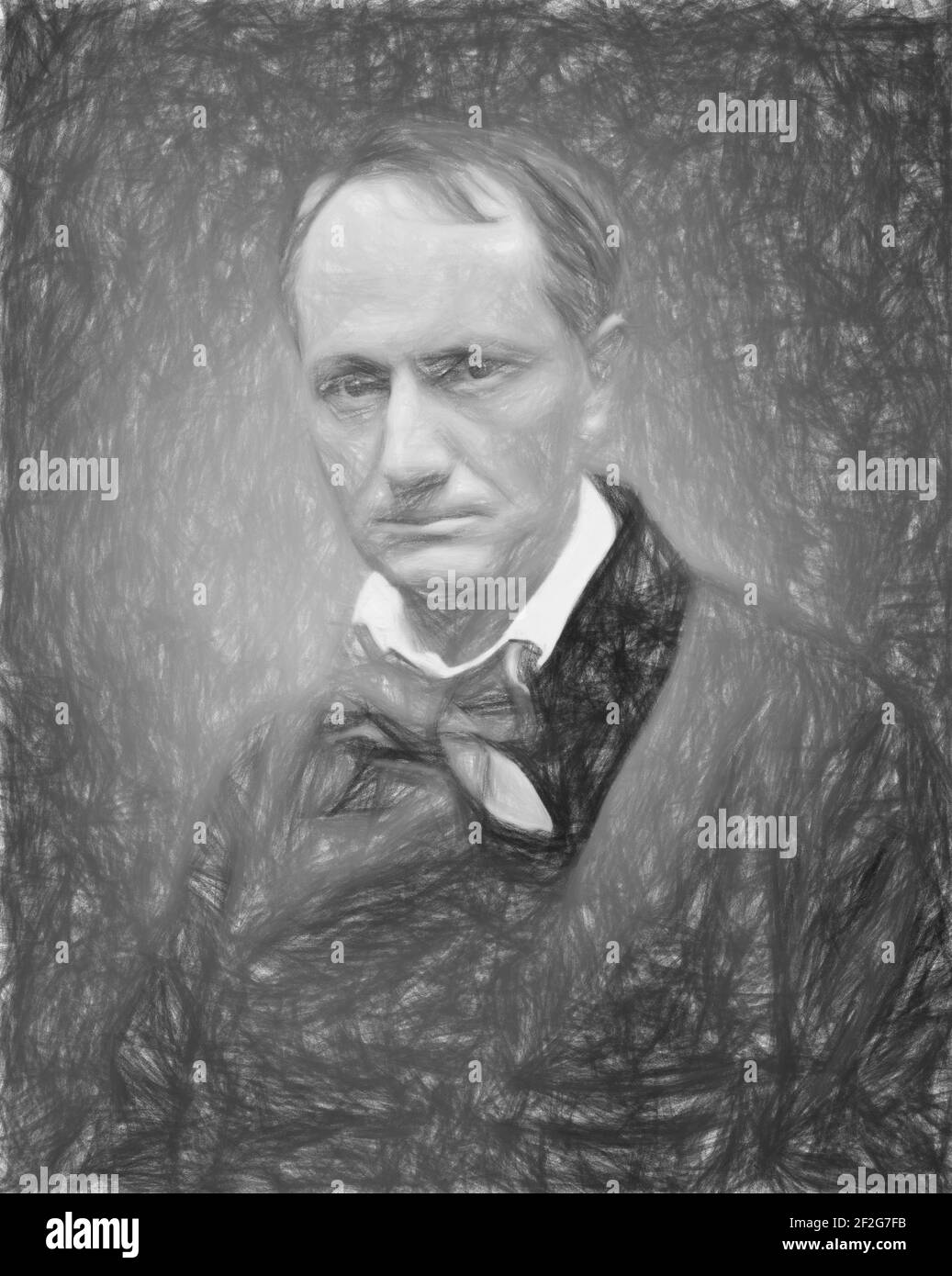 Charles Pierre Baudelaire, 1821 – 1867, French poet, portrait by Étienne Carjat, 1863, digitally altered Stock Photohttps://www.alamy.com/image-license-details/?v=1https://www.alamy.com/charles-pierre-baudelaire-1821-1867-french-poet-portrait-by-tienne-carjat-1863-digitally-altered-image414635295.html
Charles Pierre Baudelaire, 1821 – 1867, French poet, portrait by Étienne Carjat, 1863, digitally altered Stock Photohttps://www.alamy.com/image-license-details/?v=1https://www.alamy.com/charles-pierre-baudelaire-1821-1867-french-poet-portrait-by-tienne-carjat-1863-digitally-altered-image414635295.htmlRM2F2G7FB–Charles Pierre Baudelaire, 1821 – 1867, French poet, portrait by Étienne Carjat, 1863, digitally altered
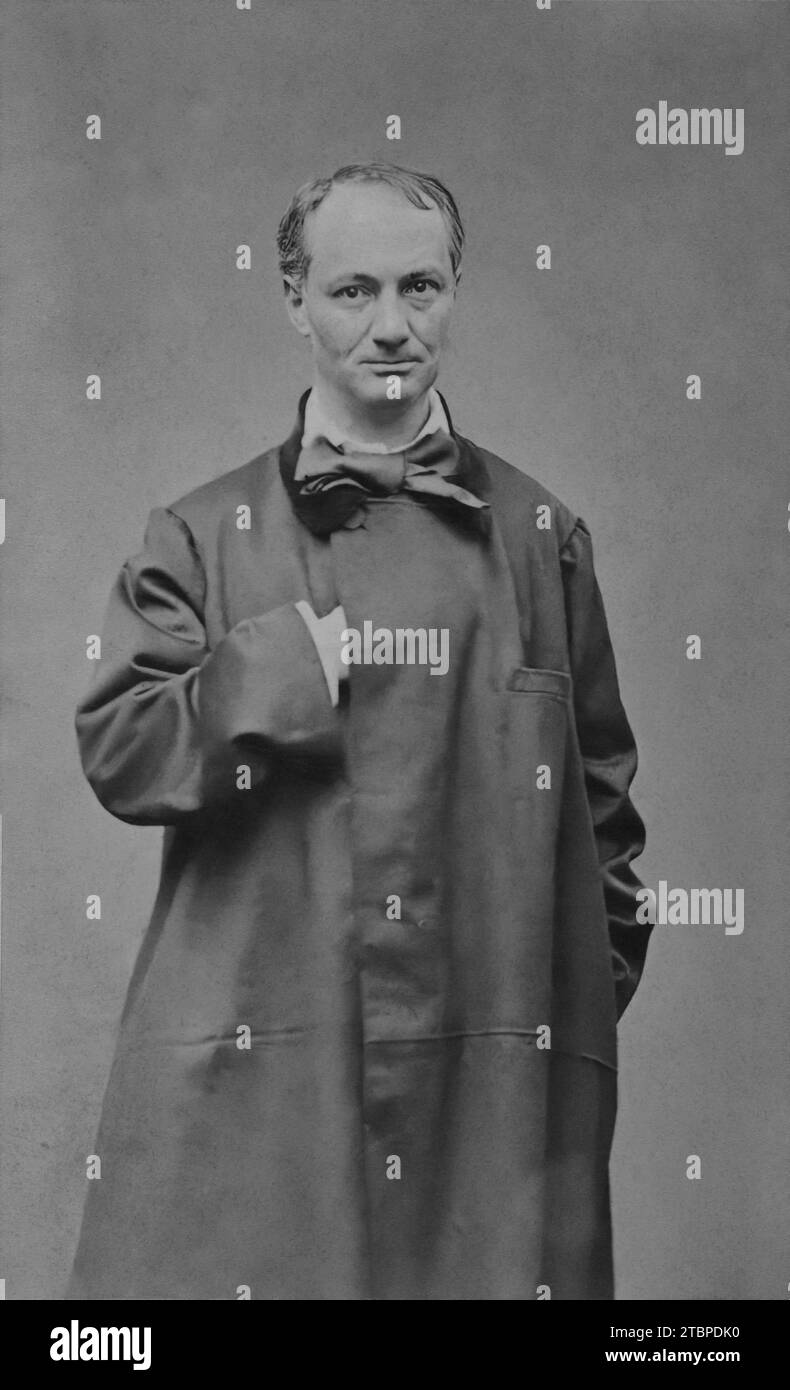 Portrait of Charles Baudelaire. Year: 1861-65. By Etienne Carjat. Stock Photohttps://www.alamy.com/image-license-details/?v=1https://www.alamy.com/portrait-of-charles-baudelaire-year-1861-65-by-etienne-carjat-image575197028.html
Portrait of Charles Baudelaire. Year: 1861-65. By Etienne Carjat. Stock Photohttps://www.alamy.com/image-license-details/?v=1https://www.alamy.com/portrait-of-charles-baudelaire-year-1861-65-by-etienne-carjat-image575197028.htmlRM2TBPDK0–Portrait of Charles Baudelaire. Year: 1861-65. By Etienne Carjat.
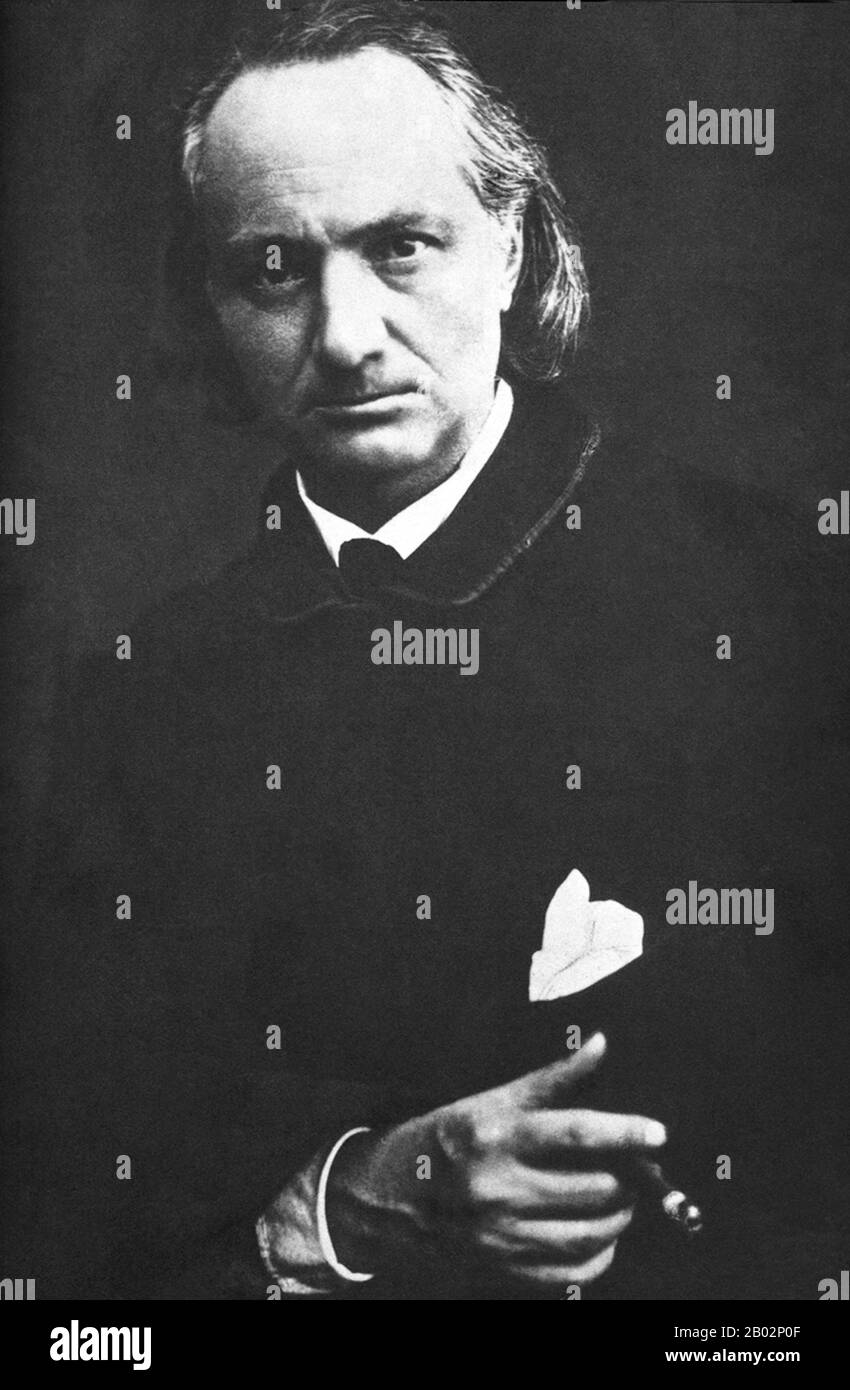 Charles Pierre Baudelaire (April 9, 1821 – August 31, 1867) was a French poet who produced notable work as an essayist, art critic, and pioneering translator of Edgar Allan Poe. His most famous work, Les Fleurs du mal (The Flowers of Evil), expresses the changing nature of beauty in modern, industrializing Paris during the 19th century. Baudelaire's highly original style of prose-poetry influenced a whole generation of poets including Paul Verlaine, Arthur Rimbaud and Stéphane Mallarmé among many others. He is credited with coining the term 'modernity' (modernité) to designate the fleeting, e Stock Photohttps://www.alamy.com/image-license-details/?v=1https://www.alamy.com/charles-pierre-baudelaire-april-9-1821-august-31-1867-was-a-french-poet-who-produced-notable-work-as-an-essayist-art-critic-and-pioneering-translator-of-edgar-allan-poe-his-most-famous-work-les-fleurs-du-mal-the-flowers-of-evil-expresses-the-changing-nature-of-beauty-in-modern-industrializing-paris-during-the-19th-century-baudelaires-highly-original-style-of-prose-poetry-influenced-a-whole-generation-of-poets-including-paul-verlaine-arthur-rimbaud-and-stphane-mallarm-among-many-others-he-is-credited-with-coining-the-term-modernity-modernit-to-designate-the-fleeting-e-image344268527.html
Charles Pierre Baudelaire (April 9, 1821 – August 31, 1867) was a French poet who produced notable work as an essayist, art critic, and pioneering translator of Edgar Allan Poe. His most famous work, Les Fleurs du mal (The Flowers of Evil), expresses the changing nature of beauty in modern, industrializing Paris during the 19th century. Baudelaire's highly original style of prose-poetry influenced a whole generation of poets including Paul Verlaine, Arthur Rimbaud and Stéphane Mallarmé among many others. He is credited with coining the term 'modernity' (modernité) to designate the fleeting, e Stock Photohttps://www.alamy.com/image-license-details/?v=1https://www.alamy.com/charles-pierre-baudelaire-april-9-1821-august-31-1867-was-a-french-poet-who-produced-notable-work-as-an-essayist-art-critic-and-pioneering-translator-of-edgar-allan-poe-his-most-famous-work-les-fleurs-du-mal-the-flowers-of-evil-expresses-the-changing-nature-of-beauty-in-modern-industrializing-paris-during-the-19th-century-baudelaires-highly-original-style-of-prose-poetry-influenced-a-whole-generation-of-poets-including-paul-verlaine-arthur-rimbaud-and-stphane-mallarm-among-many-others-he-is-credited-with-coining-the-term-modernity-modernit-to-designate-the-fleeting-e-image344268527.htmlRM2B02P0F–Charles Pierre Baudelaire (April 9, 1821 – August 31, 1867) was a French poet who produced notable work as an essayist, art critic, and pioneering translator of Edgar Allan Poe. His most famous work, Les Fleurs du mal (The Flowers of Evil), expresses the changing nature of beauty in modern, industrializing Paris during the 19th century. Baudelaire's highly original style of prose-poetry influenced a whole generation of poets including Paul Verlaine, Arthur Rimbaud and Stéphane Mallarmé among many others. He is credited with coining the term 'modernity' (modernité) to designate the fleeting, e
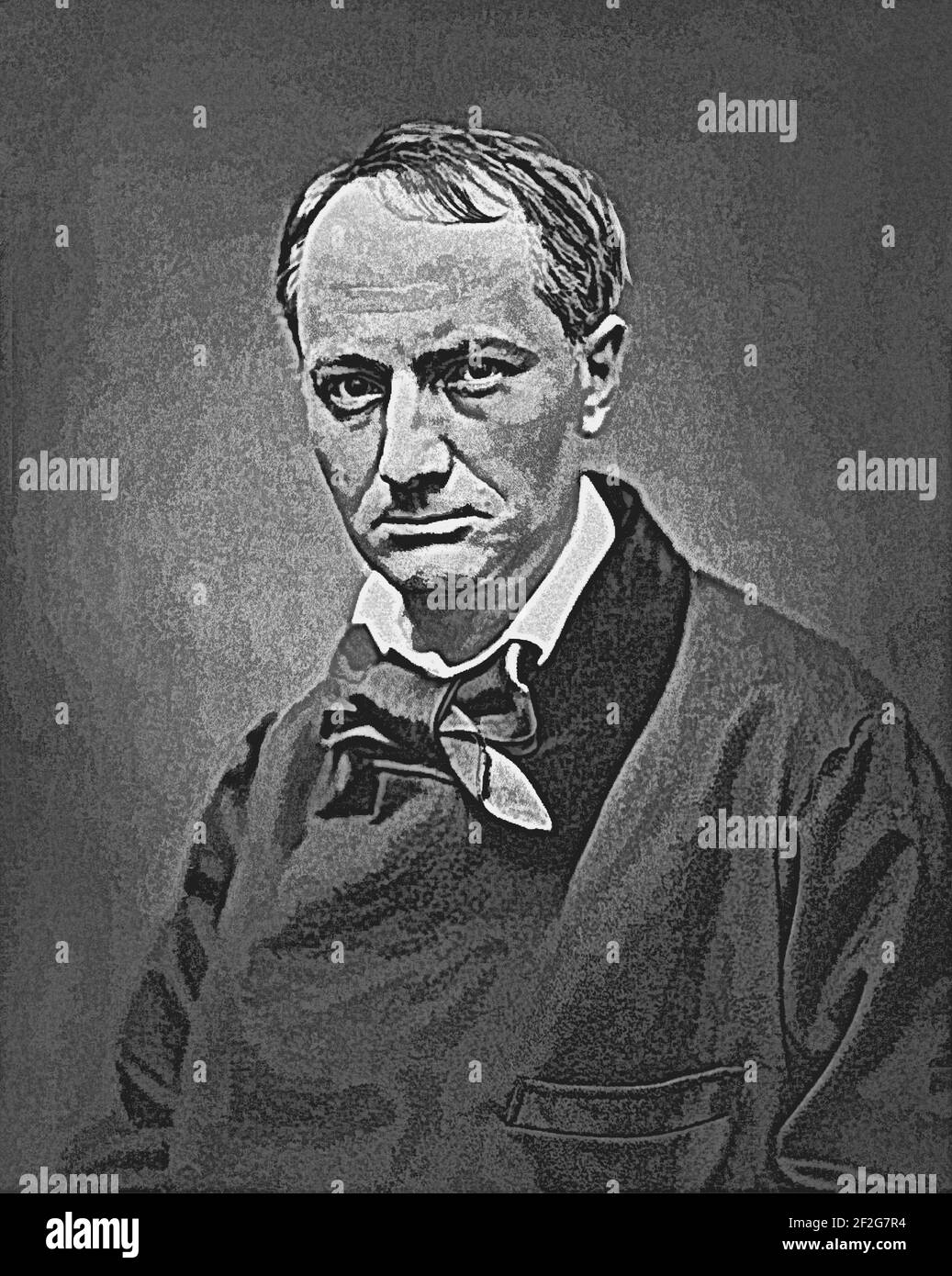 Charles Pierre Baudelaire, 1821 – 1867, French poet, portrait by Étienne Carjat, 1863, digitally altered Stock Photohttps://www.alamy.com/image-license-details/?v=1https://www.alamy.com/charles-pierre-baudelaire-1821-1867-french-poet-portrait-by-tienne-carjat-1863-digitally-altered-image414635512.html
Charles Pierre Baudelaire, 1821 – 1867, French poet, portrait by Étienne Carjat, 1863, digitally altered Stock Photohttps://www.alamy.com/image-license-details/?v=1https://www.alamy.com/charles-pierre-baudelaire-1821-1867-french-poet-portrait-by-tienne-carjat-1863-digitally-altered-image414635512.htmlRM2F2G7R4–Charles Pierre Baudelaire, 1821 – 1867, French poet, portrait by Étienne Carjat, 1863, digitally altered
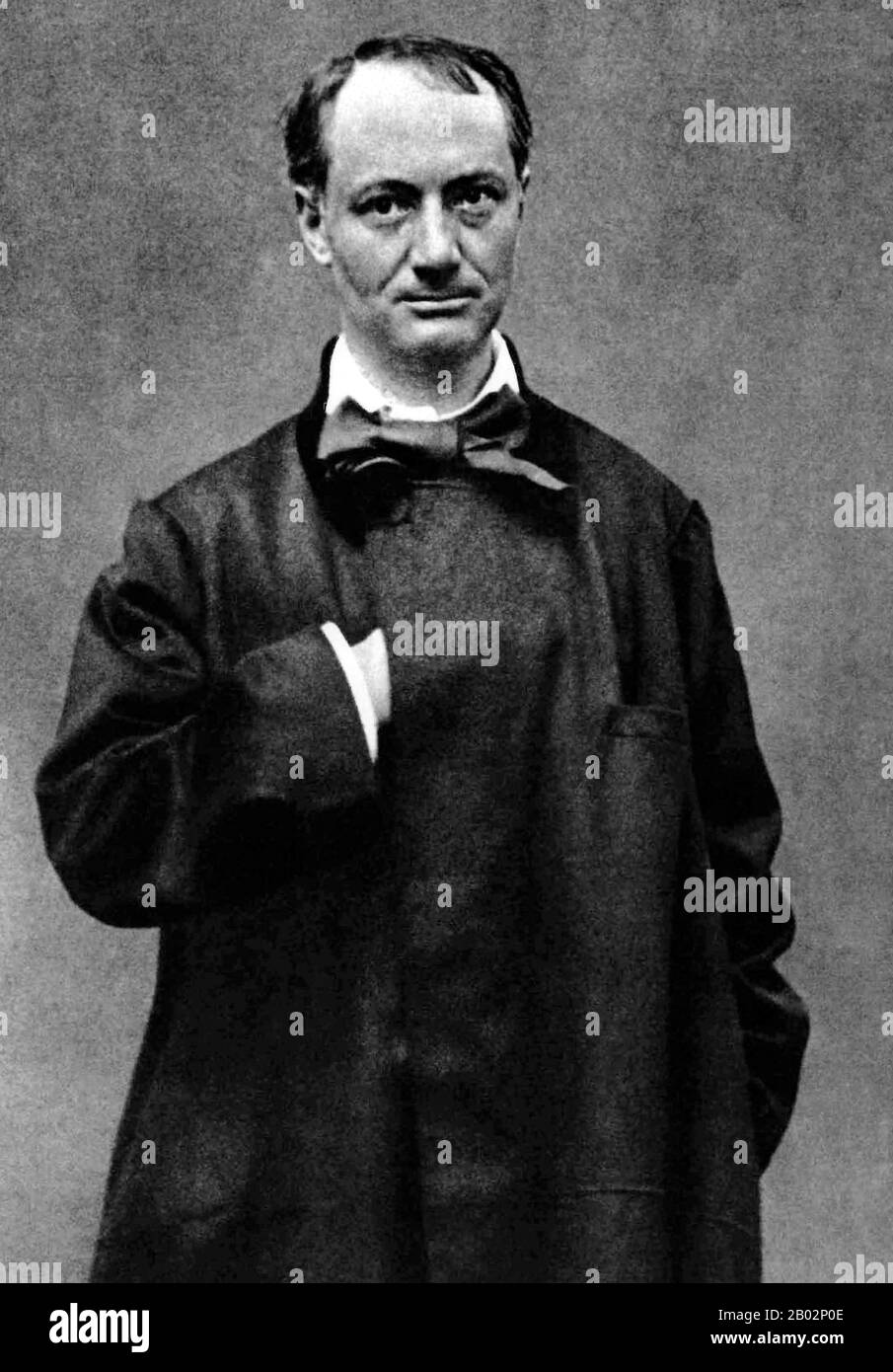 Charles Pierre Baudelaire (April 9, 1821 – August 31, 1867) was a French poet who produced notable work as an essayist, art critic, and pioneering translator of Edgar Allan Poe. His most famous work, Les Fleurs du mal (The Flowers of Evil), expresses the changing nature of beauty in modern, industrializing Paris during the 19th century. Baudelaire's highly original style of prose-poetry influenced a whole generation of poets including Paul Verlaine, Arthur Rimbaud and Stéphane Mallarmé among many others. He is credited with coining the term 'modernity' (modernité) to designate the fleeting, e Stock Photohttps://www.alamy.com/image-license-details/?v=1https://www.alamy.com/charles-pierre-baudelaire-april-9-1821-august-31-1867-was-a-french-poet-who-produced-notable-work-as-an-essayist-art-critic-and-pioneering-translator-of-edgar-allan-poe-his-most-famous-work-les-fleurs-du-mal-the-flowers-of-evil-expresses-the-changing-nature-of-beauty-in-modern-industrializing-paris-during-the-19th-century-baudelaires-highly-original-style-of-prose-poetry-influenced-a-whole-generation-of-poets-including-paul-verlaine-arthur-rimbaud-and-stphane-mallarm-among-many-others-he-is-credited-with-coining-the-term-modernity-modernit-to-designate-the-fleeting-e-image344268526.html
Charles Pierre Baudelaire (April 9, 1821 – August 31, 1867) was a French poet who produced notable work as an essayist, art critic, and pioneering translator of Edgar Allan Poe. His most famous work, Les Fleurs du mal (The Flowers of Evil), expresses the changing nature of beauty in modern, industrializing Paris during the 19th century. Baudelaire's highly original style of prose-poetry influenced a whole generation of poets including Paul Verlaine, Arthur Rimbaud and Stéphane Mallarmé among many others. He is credited with coining the term 'modernity' (modernité) to designate the fleeting, e Stock Photohttps://www.alamy.com/image-license-details/?v=1https://www.alamy.com/charles-pierre-baudelaire-april-9-1821-august-31-1867-was-a-french-poet-who-produced-notable-work-as-an-essayist-art-critic-and-pioneering-translator-of-edgar-allan-poe-his-most-famous-work-les-fleurs-du-mal-the-flowers-of-evil-expresses-the-changing-nature-of-beauty-in-modern-industrializing-paris-during-the-19th-century-baudelaires-highly-original-style-of-prose-poetry-influenced-a-whole-generation-of-poets-including-paul-verlaine-arthur-rimbaud-and-stphane-mallarm-among-many-others-he-is-credited-with-coining-the-term-modernity-modernit-to-designate-the-fleeting-e-image344268526.htmlRM2B02P0E–Charles Pierre Baudelaire (April 9, 1821 – August 31, 1867) was a French poet who produced notable work as an essayist, art critic, and pioneering translator of Edgar Allan Poe. His most famous work, Les Fleurs du mal (The Flowers of Evil), expresses the changing nature of beauty in modern, industrializing Paris during the 19th century. Baudelaire's highly original style of prose-poetry influenced a whole generation of poets including Paul Verlaine, Arthur Rimbaud and Stéphane Mallarmé among many others. He is credited with coining the term 'modernity' (modernité) to designate the fleeting, e
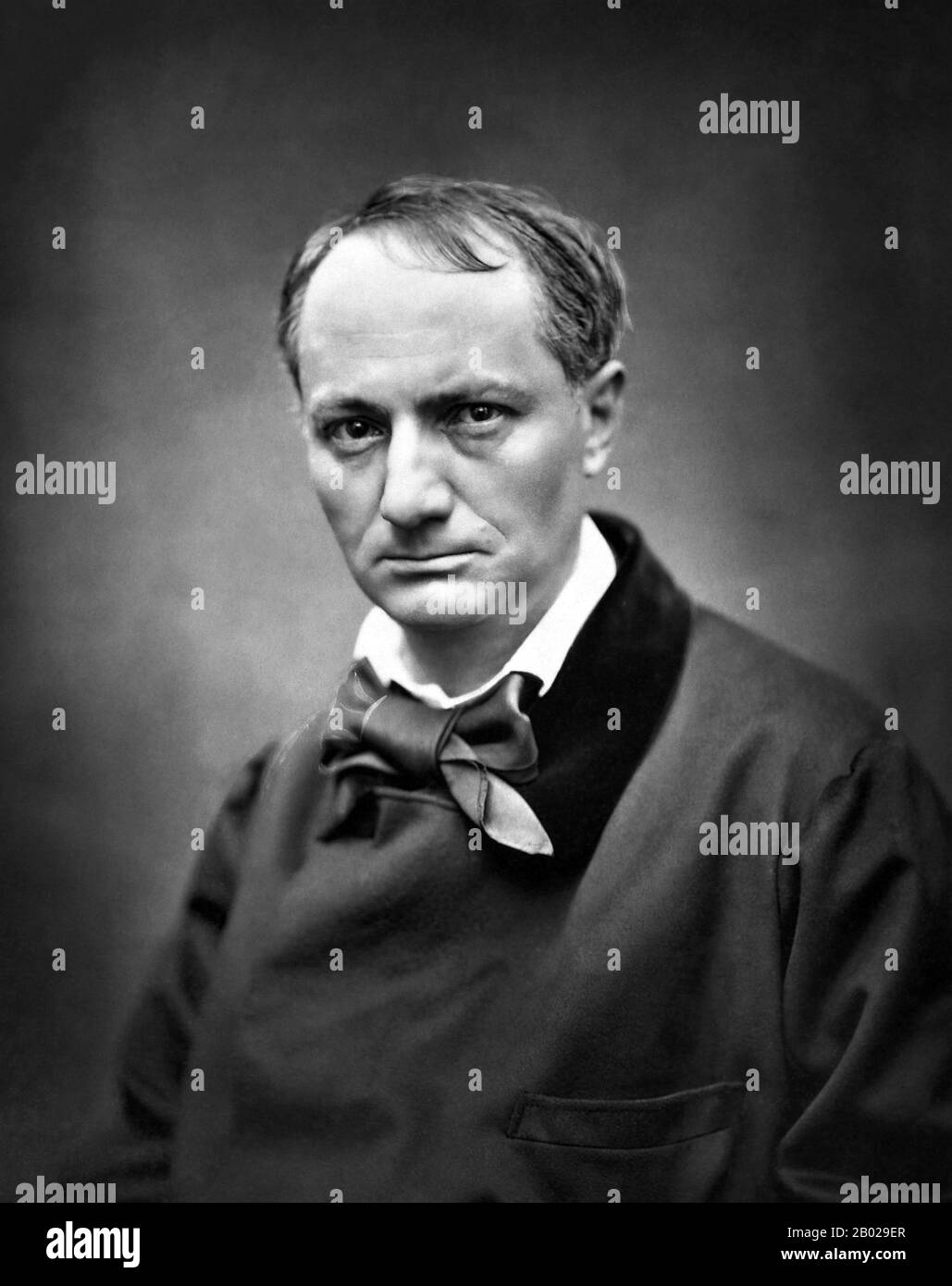 Charles Pierre Baudelaire (April 9, 1821 – August 31, 1867) was a French poet who produced notable work as an essayist, art critic, and pioneering translator of Edgar Allan Poe. His most famous work, Les Fleurs du mal (The Flowers of Evil), expresses the changing nature of beauty in modern, industrializing Paris during the 19th century. Baudelaire's highly original style of prose-poetry influenced a whole generation of poets including Paul Verlaine, Arthur Rimbaud and Stéphane Mallarmé among many others. He is credited with coining the term 'modernity' (modernité) to designate the fleeting, e Stock Photohttps://www.alamy.com/image-license-details/?v=1https://www.alamy.com/charles-pierre-baudelaire-april-9-1821-august-31-1867-was-a-french-poet-who-produced-notable-work-as-an-essayist-art-critic-and-pioneering-translator-of-edgar-allan-poe-his-most-famous-work-les-fleurs-du-mal-the-flowers-of-evil-expresses-the-changing-nature-of-beauty-in-modern-industrializing-paris-during-the-19th-century-baudelaires-highly-original-style-of-prose-poetry-influenced-a-whole-generation-of-poets-including-paul-verlaine-arthur-rimbaud-and-stphane-mallarm-among-many-others-he-is-credited-with-coining-the-term-modernity-modernit-to-designate-the-fleeting-e-image344258735.html
Charles Pierre Baudelaire (April 9, 1821 – August 31, 1867) was a French poet who produced notable work as an essayist, art critic, and pioneering translator of Edgar Allan Poe. His most famous work, Les Fleurs du mal (The Flowers of Evil), expresses the changing nature of beauty in modern, industrializing Paris during the 19th century. Baudelaire's highly original style of prose-poetry influenced a whole generation of poets including Paul Verlaine, Arthur Rimbaud and Stéphane Mallarmé among many others. He is credited with coining the term 'modernity' (modernité) to designate the fleeting, e Stock Photohttps://www.alamy.com/image-license-details/?v=1https://www.alamy.com/charles-pierre-baudelaire-april-9-1821-august-31-1867-was-a-french-poet-who-produced-notable-work-as-an-essayist-art-critic-and-pioneering-translator-of-edgar-allan-poe-his-most-famous-work-les-fleurs-du-mal-the-flowers-of-evil-expresses-the-changing-nature-of-beauty-in-modern-industrializing-paris-during-the-19th-century-baudelaires-highly-original-style-of-prose-poetry-influenced-a-whole-generation-of-poets-including-paul-verlaine-arthur-rimbaud-and-stphane-mallarm-among-many-others-he-is-credited-with-coining-the-term-modernity-modernit-to-designate-the-fleeting-e-image344258735.htmlRM2B029ER–Charles Pierre Baudelaire (April 9, 1821 – August 31, 1867) was a French poet who produced notable work as an essayist, art critic, and pioneering translator of Edgar Allan Poe. His most famous work, Les Fleurs du mal (The Flowers of Evil), expresses the changing nature of beauty in modern, industrializing Paris during the 19th century. Baudelaire's highly original style of prose-poetry influenced a whole generation of poets including Paul Verlaine, Arthur Rimbaud and Stéphane Mallarmé among many others. He is credited with coining the term 'modernity' (modernité) to designate the fleeting, e